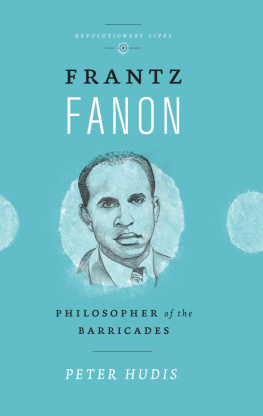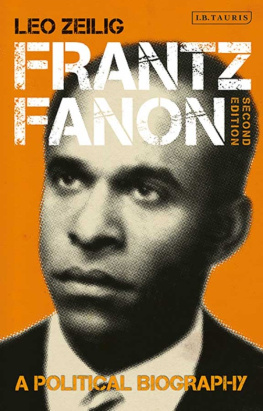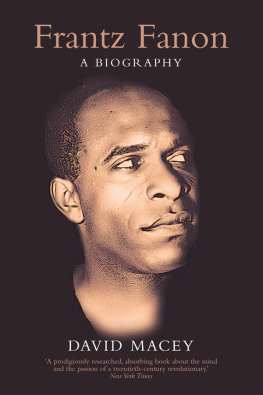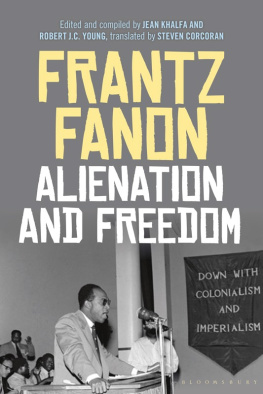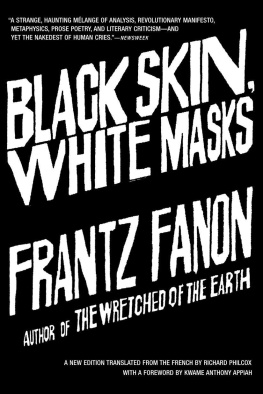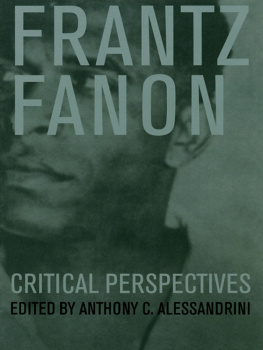Frantz Fanon
Revolutionary Lives
Series Editors: Sarah Irving, University of Edinburgh;
Professor Paul Le Blanc, La Roche College, Pittsburgh
Revolutionary Lives is a series of short, critical biographies of radical figures from throughout history. The books are sympathetic but not sycophantic, and the intention is to present a balanced and, where necessary, critical evaluation of the individuals place in their political field, putting their actions and achievements in context and exploring issues raised by their lives, such as the use or rejection of violence, nationalism, or gender in political activism. While individuals are the subject of the books, their personal lives are dealt with lightly except insofar as they mesh with political concerns. The focus is on the contribution these revolutionaries made to history, an examination of how far they achieved their aims in improving the lives of the oppressed and exploited, and how they can continue to be an inspiration for many today.
Also available:
Salvador Allende:
Revolutionary Democrat
Victor Figueroa Clark | Sylvia Pankhurst:
Suffragette, Socialist and Scourge of Empire
Katherine Connelly |
Hugo Chvez:
Socialist for the Twenty-first Century
Mike Gonzalez | Percy Bysshe Shelley:
Poet and Revolutionary
Jacqueline Mulhallen |
Leila Khaled:
Icon of Palestinian Liberation
Sarah Irving | Ellen Wilkinson:
From Red Suffragist to Government Minister
Paula Bartley |
Jean Paul Marat:
Tribune of the French Revolution
Clifford D. Conner | Gerrard Winstanley:
The Diggers Life and Legacy
John Gurney |
www.revolutionarylives.co.uk
Frantz Fanon
Philosopher of the Barricades
Peter Hudis

First published 2015 by Pluto Press
345 Archway Road, London N6 5AA
www.plutobooks.com
Copyright Peter Hudis 2015
The right of Peter Hudis to be identified as the author of this work has been asserted by him in accordance with the Copyright, Designs and Patents Act 1988.
British Library Cataloguing in Publication Data
A catalogue record for this book is available from the British Library
ISBN | 978 0 7453 3630 5 | Hardback |
ISBN | 978 0 7453 3625 1 | Paperback |
ISBN | 978 1 7837 1684 5 | PDF eBook |
ISBN | 978 1 7837 1686 9 | Kindle eBook |
ISBN | 978 1 7837 1685 2 | EPUB eBook |
This book is printed on paper suitable for recycling and made from fully managed and sustained forest sources. Logging, pulping and manufacturing processes are expected to conform to the environmental standards of the country of origin.
Typeset by Stanford DTP Services, Northampton, England
Text design by Melanie Patrick
Simultaneously printed by CPI Antony Rowe, Chippenham, UK and Edwards Bros in the United States of America
Contents
Acknowledgements
I would like to thank Paul Le Blanc and David Castle of Pluto Press for their assistance and encouragement through all stages of creating this work.
Although my intellectual affinities and influences will be evident from the content of this book, no figure looms larger in shaping the ideas that gave birth to it than Raya Dunayevskaya (191087), who first alerted me to the power of Fanons revolutionary humanism and who, above all else, taught me how to think.
Introduction:
Fanon in Our Time
F ifty years after the formal end of European colonialism, and almost a decade after the United States had seemed to some to turn the corner on racism by electing its first black president, the specter of Frantz Fanon has returnedwith a vengeance. Largely consigned to academic studies and debates over postcolonialism, difference and alterity for many years, Fanons name suddenly went viral in December 2014. Within days of a New York City grand jurys decision not to indict the police officers who had strangled to death Eric Garner, an unarmed black man who was trying to sell a few cigarettes, a comment by Fanon appeared on numerous social media sites that was quickly picked up and quoted around the countryand in many parts of the world. It read: When we revolt its not for a particular culture. We revolt simply because, for many reasons, we can no longer breathe. The statement seemed to capture the pain and poignancy of the moment, as tens of thousands of people poured into the streetsoften spontaneouslyto protest the injustice done to Garner as well as to Michael Brown, an 18-year-old black youth from Ferguson, Missouri who was murdered by a policeman that a grand jury likewise chose not to indict a few weeks earlier.
Actually, it turns out that the quotation from Fanon was somewhat truncated. The actual statement, made in The Wretched of the Earth, reads: It is not because the Indo-Chinese discovered a culture of their own that they revolted. Quite simply this was because it became impossible to breathe, in more than one sense of the word.police abuse and racial and religious discrimination throughout Europe. Time seems to be marching backward in many respects, as xenophobicas well as subtler but no less insidiousforms of racism seem to define the very shape of globalized capitalism in the twenty-first century.
Whatever was meant by the promise, voiced following the collapse of statist communism in Eastern Europe and Russia in 1991, that a new world order was now before us based on principles of liberal democracy, it certainly has not brought us to a world any less overdetermined by racial profiling, racial prejudice, and racial injustice. Time seems to be marching backward indeed... but the question is, to what? To the kind of world that Fanon saw and criticized? To something even more barbaric? Or does the response by a new generation of activists and thinkers to what has aptly been termed the new Jim Crow in the United States foreshadow an effort to put all this aside, and reclaim what existing society repeatedly denies, especially to people of colorour humanity?
The challenges facing any effort to forge a revolutionary new beginning today are surely enormous. No sooner do new voices arise against the dehumanization that defines contemporary capitalism than they risk being subsumed by religious fundamentalist terrorism and the reactionary response to it by the Western powers. Violent attacks on journalists, feminists, Jews and others in the name of some mythical incarnation of Islam, whether it occurs in France, Syria or anywhere else, testifies to how divorced todays apostles of mindless violence are from any liberatory impulse. The Islamic fundamental-ists who murder civilians in France have the same aim as Christian fundamentalists who do the same in Norway or the U.S.they wish to push history backward by provoking permanent inter-religious warfare (the same of course applies to Jewish fundamentalists in their attacks on Palestinians). No less mindless is the response of the Western powersnot only because of their persistent discrimination against immigrants, Muslims, and people of color but also because their response to religious-inspired terrorism is characterized by such a huge degree of

